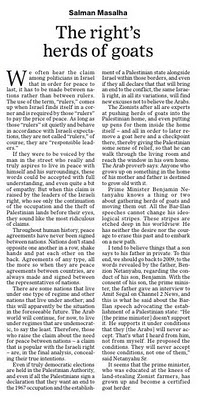The murderous Ba’ath regime, which pretended to be the standard bearer of Arab nationalism, is the bloody testimony to the failure of that nationalism.
Salman Masalha ||
No Grass in the Arab world
No Grass in the Arab world
For more than a year now Syrian President Bashar Assad has been sending out his army and sowing destruction and reaping death in the cities of Syria. Every day we read about yet another massacre here and more slaughter there. Assad keeps asserting that these things never happened and blames terrorist gangs for the crimes. Apparently he knows whereof he speaks. The crimes are indeed being committed by terrorist gangs – the Shabbiha, the tribal Ba’ath regime’s murderous “combat support” gangs of thugs.
The murderous Ba’ath regime, which pretended to be the standard bearer of Arab nationalism, is the bloody testimony to the failure of that nationalism. This fraud is evident for all to see in the horrors being perpetrated daily throughout Syria. The world, including the part of it called “the Arab word,” continues to sit and do nothing. And the Arab world is waiting for foreign, non-Arab, countries to come and help “our Arab brothers” who are being slaughtered by Arabs.
Ironically, the Syrian poet who wished for the death of the West found nowhere but Paris, in that very same West, to live as a free person. Not too long ago a media storm raged over a poem concerning Iran published by German writer Gunter Grass. The poem, of course, awakened many sleeping dogs. However, as weighed against the Syrian poet it would seem that the balance in fact tips in favor of Grass.
Years ago, before the “Arab spring,” a delegation of writers traveled to Yemen to participate in a conference called “An Arab-German Cultural Dialogue,” with the participation of Grass, the late Mahmoud Darwish, Adonis and others.
The Yemeni president invited the participants to his palace. After greeting the writers in “poor Arabic,” as one of those present at the meeting subsequently related, he announced he was going to award the Yemeni medal of honor to Grass. Grass, however, surprised the president by standing up and declaring he would not be able to accept the award as long as the president did not release a young Yemeni writer who had been arrested for expressing his opinion.
The “Arab” president was in fact very embarrassed, as he was not accustomed to statements like that at such events. However, the consternation should in fact have been the lot of all the Arab writers because by this act the German writer revealed the group of intellectuals in all its worthlessness. Once again it was “the foreigners” who had the courage to come out in defense of their Arab “brothers’” freedom of speech.
Adonis, of course, continues to enjoy the pleasures of Western freedom in the City of Lights. However, his freedom is fraudulent, since he has never internalized the values of freedom. On the contrary, Adonis remains imprisoned in the tribal world from which he comes. We learn this from his thunderous silence about what is happening in the land of his birth, Syria. Again and again he squirms and does not gather the courage to come out against the murderous regime in his country. In an interview he granted recently Adonis went so far as to try to defend the butcher of Damascus. He asserted that France is betraying the values of the French Revolution by supporting the reactionary forces in the Arab world – as though the butcher in Damascus were the paragon of liberty, equality and fraternity.
However, we need only remember that Adonis belongs to Assad’s Alawite tribe in order to understand the root of the evil in the Arab world. The poet’s squirms and evasions in light of the horrors in Syria exemplify his betrayal of the values he pretends to represent. Compared to Grass, Adonis and his ilk are part of the Arabs’ problem and not part of its solution.
*
Published in Hebrew: Haaretz, June 13, 2012
----------




 Salman Masalha
Salman Masalha













